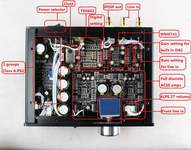|
About ACSS
technology:
ACSS
(Audio-gd Current Signal System) technology is Audio-gd's signature
technology for transmitting audio signals in the current domain.
This concept, first seen in 1966, has been adapted by us for many
years. Since 2005, we have been evolving this technology to include
it into all audio signal transmissions in our systems from digital
source to power amplifier. Since 2006, ACSS technology became Audio-gd's
signature technology and gains a lot of popularity.
About NFB?
NFB means Non-Feedback.
The NFB-16 is a portable
headphone amp built in DAC. At two years ago some customers
advice me design a portable DAC + amp . But consider the amp parts
can't support low to 5V power supply, and I don't want design by a
chip as the amp, I can't design at that time.
I always like to try to design
this amp, after a lot practices, at last year I design the wide
power supply ACSS amp, it can working well at +4 to +36V DC, but in
NFB-16 have been limit the highest power supply at +18V DC.
The NFB-16 applies the
newest high-end dual WM8741 and USB asynchronous transmit chip
TE8802 which can support up to 24Bit/192KHz input
(AES and Coaxial inputs support up to 192KHz .. Similar to other
portable design, Our NFB-16 applies
Non-feedback discrete ACSS output stage. The dual WM8741 feed to the ACSS output
stage without any OPAs so it can achieve very neutral sound quality.
The ACSS is a non-feedback
technology made with fully discrete amplifiers. Most people know the
global
feedback design can offer better specs in test measurements, and
non-feedback can't do well in test measurements but can offer better
sound for the human's ears. Here is a conflict of the classic circuits.
But the ACSS opens a new field, it can offer a least coloration sound
which is more neutral with very low distortion and high linearity. So
it can retain the dynamics, detail and neutral sound but not sound
bright or harsh.
The output buffers are
Non-feedback. For low impedance, we applied a diamond output stage
which is quite less colored than most conventional circuits.
The 24/192 USB interface
outputs a I2S signal to dual WM8741.
NFB-16 applies the excellent
WM8741 and excellent analog output
stages, but these are not the only keys of the best sound. The power
supply is most important. Even applying the best DA chip and the best
amp, if matched to a normal power supply, the total sound may still be
average or sound musical but can't be neutral and detailed. That is why
it is easy to find hi-end grade gears maybe without the best chips or
amp stages, but with plenteous dedicated DC supply circuits.
The
NFB-16
uses 2 groups of high-quality class A PSU
with dedicated DC
supply.
¡@

About volume in ACSS circuits:
For a headphone amp, the volume control is very
important.
NFB-16 uses ACSS technology, which is very
different from conventional technology.
The volume
control is is placed at the ACSS modules output, where the output is the current signal, not the
voltage signal. The volume control is I/V conversion, and the volume
depends on the current (I) conversion to the voltage (V). (Like D/A
chips output I/V conversion)
As you can see, ACSS circuits have no
gain, as it is a completely different circuit.
The sound quality benefits from I/V
conversion volume control. Mark Levinson also knows that current
volume control has great benefits, so in their Top End preamp NO.32
volume control, they use many components to change the signal to
current signal (I), then through the R-2R network to control the
volume, and then change back to voltage signal (V) again. But NFB-16 is simply a more complete work in terms of the current signal,
and technically, it is superior to conventional technology.
¡@ |

